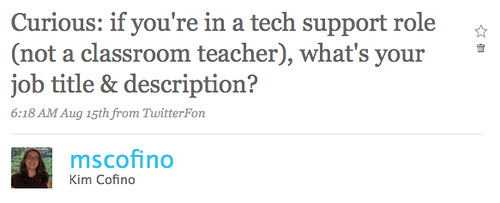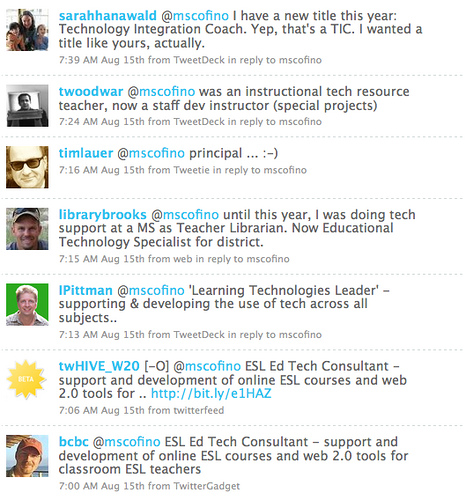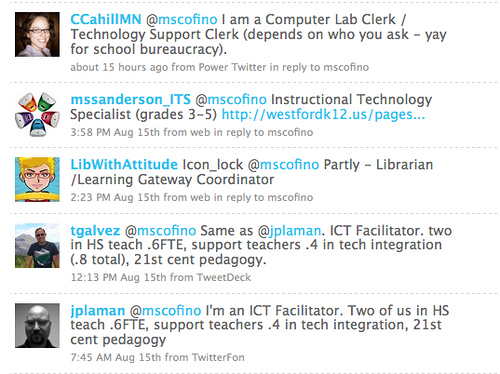Facilitator, Coach or Coordinator? by Kim Cofino

Cross-posted on Always Learning
What's your job title? Yesterday I asked my twitter network the following question:
And received a lot of interesting responses:




Most of us sharesimilar responsibilities, yet we have a wide variety of titles. Just looking back at my own experience over the last ten years in three different schools, my job titles have ranged from Technology Facilitator to Academic IT Coordinator, to 21st Century Literacy Specialist, to Technology Coach, to Technology and Learning Coordinator. What is it about technology in education that makes it so difficult to define roles that everyone can agree on and understand? Even though we've had technology in schools for decades, it still seems like we're making it up as we go along. For the last few years I've been wondering if there are more established roles, that already exist (and are well-understood) in many schools, which could provide a model for this type of support position. Just because technology often deals with new ways of thinking about education, doesn't mean that the process of supporting those new ways of thinking has to be different. Looking at Librarians When I first arrived at ISB two years ago, I realized just how much librarians have in common with technology facilitators. What impressed me most was the extensive research in the field of librarianship about the process (and effect) of collaboration among colleagues. Although the day-to-day tasks of a librarian versus a technology facilitator might be very different; the established, research-based process of collaboration, which librarians have been refining for decades, certainly provides an interesting inspiration for technology facilitation. Considering Coaching With the change in my position this school year, I've been thinking a lot about what another established educational role might have to offer technology facilitators: the Instructional Coach. This week, our fabulous visiting consultant, and experienced Literacy Coach, Maggie Moon, attended our Coaching team meeting. She shared an overview of her successes and pitfalls to avoid as a coach:
- A coach's 3 major tasks in order of priority are: in the classroom (with teachers & kids, 1:1 or with groups of teachers), out of the classroom (with teachers, 1:1 or with groups of teachers), prep & planning.
- As a coach, begin with a vision of what you think teachers should/could do. What does the "ideal" teacher look like? How will we see the evidence that our teachers are meeting these expectations?
- Teaching teachers is just like teaching students: always explain things clearly & succinctly, and remember to show not just tell.
- Always focus more on the process of teaching well, rather than the content that needs to be taught. Let the content come through as you model best practice instruction.
- Be sure to track teacher progress by using a conferring notebook with items you've been trying to teach, times you are going in to see the teachers doing it (checklist), quality of what teachers are doing - use this to plan more in-classroom work.
- Have teachers bring student work with them during meeting time so there is evidence of what they are doing and students are learning.
- Getting started: keep it small, cycle through grade levels (work with 2 grade levels a month, go into classrooms and check in 1:1 with the other grade levels). Sometimes it makes sense to start with groups to plant seeds, and then continue 1:1.
3 Phases of coaching (rotate through these phases - always possible to return to any of the previous stages): 1. Modeling: in the classroom, you're teaching the class while the teacher is watching.
- Pre-conference: Be clear about setting up, discuss with the teacher beforehand what you're doing & what to watch for and notice. Strategy: use guide sheets which gives structure of how lesson will go and the main components to keep teachers active during lessons
- In the classroom: Model best practice
- Post-conference: You reflect at the end of the lesson on what you felt went well, what you would change, to model reflection - reinforcement & refinement. Then, ask teachers what they notice (what questions does this raise?). Then discuss: "how does what you saw me do, differ from what you do?" (what's different?). Finally, ask "whatever you just saw, how will that change what you do in your classroom?"
2. Coaching: in the classroom, the teacher teaches & you watch (next to them) - give feedback in the moment
- Start with a reflection with the teacher, ask them what they felt went well, always focus on the positive and be complimentary (any issues, record them and save them for later).
- If there are content issues (incorrect information), share this right away; issues with methods should be saved for later.
3. Co-teaching (good when you've planned a unit over time, building relationships) Looking over Maggie's coaching suggestions, I can easily see how all of them are relevant to technology facilitation. From the goal of being in the classroom as a top priority, to focusing on the process not the content, to starting small; everything Maggie shared fit closely with my experience and understanding of technology facilitation. It's particularly interesting to me that the process of coaching can be expressed in such concrete steps, so no matter what the grade level or content, Maggie follows a clear process that results in quality collaboration and teaching. Although I like to think I follow a "process" myself, I feel that, in practice, technology facilitation is often far less systematic. Because it's so organic, technology facilition can tend to be more individualized - different for each project and teacher. Although I love the fact that everything I do is tailored for each teacher, it's possible that, as facilitators, we end up re-inventing the wheel each time, simply because we don't have a systematic approach. In fact, as Maggie was sharing her tips, our science and math coaches were nodding along with the terminology and processes she described, demonstrating that instructional coaching across content areas shares a vocabulary and philosophy that is worth investigating.
Tools and ideas to transform education. Sign up below.
Final Thoughts
Although I can appreciate how much both librarians and coaches have to offer technology facilitators, I still feel that there is something different about technology. When Literacy Coaches are helping teachers learn how to teach reading better, those teachers still know something about teaching reading, they know how to read a book, they know how to spell, and how to write, because the tools of the subject are familiar to them. Technology doesn't share the same tradition in schools. So what happens when the content area is just as new to the teacher as the best practice teaching? And then of course, the technological support has to be considered. It would be great to focus solely on the pedagogy, but who deals with the broken projector and the students that can't log in? I'm sure these are some of the reasons why we have so many different job titles and descriptions. Clearly, while we can definitely benifit from the extensive experience of librarians and coaches in schools, there is more to a technology support role that needs to be included. So, I'm left wondering:
- What is still undefined in our conception of the role of a technology facilitator/coach/coordinator?
- How can we start building consensus on our roles in schools?
- What can't we find that's relevant to technology support when examining more established positions in schools?
- What does your job description include?
